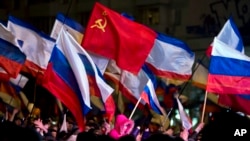WASHINGTON —
Crimea’s secessionist referendum is one of many examples of a region or territory attempting to part from the country to which it belongs. Experts say some secessionist movements have the backing of international law, but many do not. An American legal scholar says Crimea’s referendum was illegitimate, and its annexation by Russia would be illegal.
Around the world, there are many places where majority sentiment favors secession. But most do not meet international legal standards for doing so, according to John Bellinger, who served as the State Department’s top lawyer during the former Bush administration.
“While international law in general speaks about rights of self-determination, in general international law prefers the principle of territorial integrity of states, and only recognizes the right of a people or a group to secede from a larger state in very limited circumstances. Namely, if the government of the larger state has absolutely denied that group or people their rights inside the country or has committed gross rights violations against them," said Bellinger.
Bellinger notes that whatever fears pro-Russian Crimeans may have about their treatment under Ukraine’s new government, gross violations have yet to be documented. In other words, Crimea’s secessionist bid is entirely premature.
Moscow notes that Crimea was once part of Russia, and that popular sentiment in Crimea is decidedly pro-Russian. Bellinger says neither point legally justifies secession.
“Historical facts or even the popular will inside Crimea, as a matter of international law, do not matter. Otherwise, the international system would fragment and break down," he said.
Bellinger says Crimea’s secession could embolden groups from Spain to Cyprus to East Asia and beyond.
Russia compares Crimea’s secessionist bid to that of Kosovo, which declared independence from Serbia in 2008. Bellinger says the two cases are very different.
“Kosovo was a unique situation, part of the overall break-up of the former Yugoslavia. Kosovo was subject to U.N. supervision under a U.N. Security Council resolution for over a decade. The Kosovar people had been subjected to gross human rights violations by the Serbians. And after a long period of time to remedy the situation, a specially-appointed U.N. envoy had actually recommended independence for Kosovo. None of those circumstances are present here [in Crimea]," he said.
Bellinger notes that enforcing international law can be difficult, pointing to Russia’s veto of a Security Council resolution that would have declared the Crimean referendum invalid. He notes a General Assembly resolution condemning the referendum would be non-binding, as would any finding by the International Court of Justice.
Around the world, there are many places where majority sentiment favors secession. But most do not meet international legal standards for doing so, according to John Bellinger, who served as the State Department’s top lawyer during the former Bush administration.
“While international law in general speaks about rights of self-determination, in general international law prefers the principle of territorial integrity of states, and only recognizes the right of a people or a group to secede from a larger state in very limited circumstances. Namely, if the government of the larger state has absolutely denied that group or people their rights inside the country or has committed gross rights violations against them," said Bellinger.
Bellinger notes that whatever fears pro-Russian Crimeans may have about their treatment under Ukraine’s new government, gross violations have yet to be documented. In other words, Crimea’s secessionist bid is entirely premature.
Moscow notes that Crimea was once part of Russia, and that popular sentiment in Crimea is decidedly pro-Russian. Bellinger says neither point legally justifies secession.
“Historical facts or even the popular will inside Crimea, as a matter of international law, do not matter. Otherwise, the international system would fragment and break down," he said.
Bellinger says Crimea’s secession could embolden groups from Spain to Cyprus to East Asia and beyond.
Russia compares Crimea’s secessionist bid to that of Kosovo, which declared independence from Serbia in 2008. Bellinger says the two cases are very different.
“Kosovo was a unique situation, part of the overall break-up of the former Yugoslavia. Kosovo was subject to U.N. supervision under a U.N. Security Council resolution for over a decade. The Kosovar people had been subjected to gross human rights violations by the Serbians. And after a long period of time to remedy the situation, a specially-appointed U.N. envoy had actually recommended independence for Kosovo. None of those circumstances are present here [in Crimea]," he said.
Bellinger notes that enforcing international law can be difficult, pointing to Russia’s veto of a Security Council resolution that would have declared the Crimean referendum invalid. He notes a General Assembly resolution condemning the referendum would be non-binding, as would any finding by the International Court of Justice.
